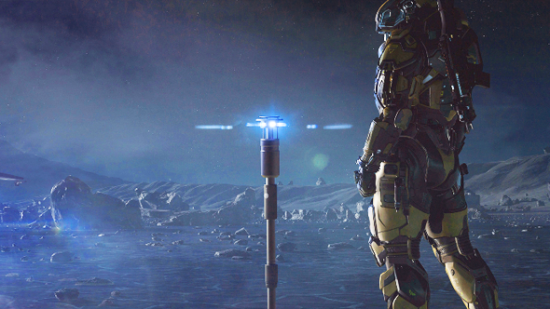Last year, the developers of Star Citizen offered players the chance to purchase a beacon that would let them lay claim to a 4x4km plot of land in the game. The UEE Land Claim Licence can be thrust into the ground anywhere in UEE (United Empire of Earth) space to take ownership of a square patch of earth, with the benefit that your property rights will be defended by the UEE security forces – Star Citizen’s space cops.
But what are the implications – and potential pitfalls – of owning property in its virtual universe? And can you actually own things that don’t really exist, at least, in a physical sense? And what does any of this have to do with people breaking into your house and having sex in Second Life?
What’s the legal status of virtual property?
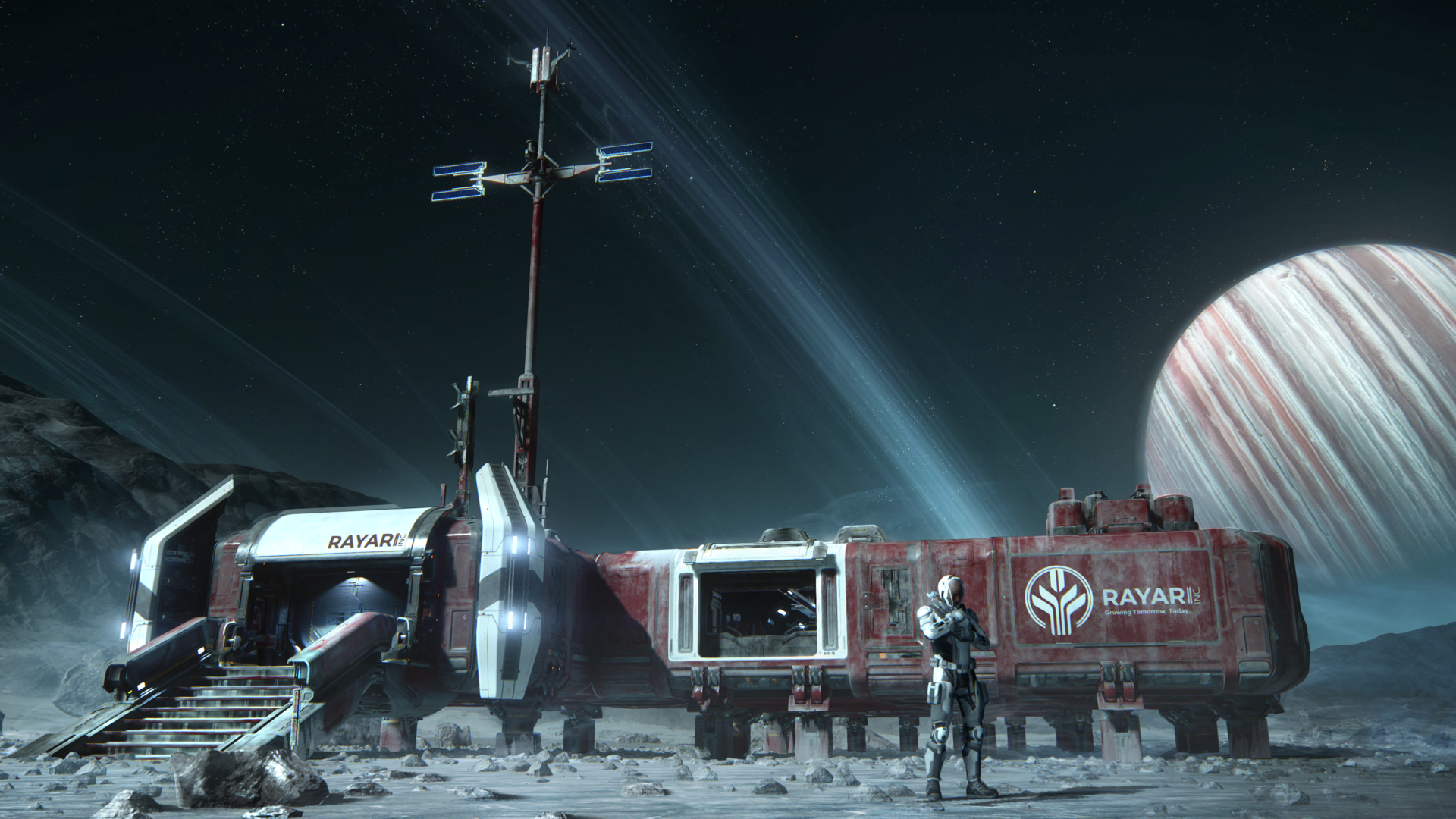
I spoke to James Chang of the international law firm Pillsbury, who specialises in videogame-related cases, and asked what you are actually buying when you purchase virtual property in Star Citizen and other games. According to him, you are essentially obtaining two sets of rights – real-world rights and in-game rights.
“Most of the time, when you talk about a virtual property transaction,” Chang says, “you are talking about a purchase from the developers to the player. Real-world rights in this transaction are going to be generated out of the terms of service. These terms of service are always drafted by the developer, and anyone who wants to play a game must usually agree to them in their entirety.
“These agreements vary from developer to developer and spell out what their obligations are as the seller to the buyer; which, in most cases, are going to be very different from a seller of real-world property. For example, virtual property might not be transferable from the buyer to another user, and in most cases, developers probably would have reserved the right to take away the property at any time, since no developers are going to want to be required to keep their servers – the universe where a game exists – running, if it becomes unprofitable to operate.”
This is an important point. Essentially, your rights to own virtual property in a game cease to exist if the developers shut down the game or go bankrupt. In this sense, buying virtual property is unlike buying, say, a plot of land for cash in the real world. If the person you bought the land off suddenly goes bankrupt, you do not lose the land. But that can – and does – happen in videogames.
However, Chang notes that you are not really buyingproperty in videogames – you are leasingit. And in that sense, he says, “virtual property as implemented in a game like Star Citizen is different from property in the real world.” Transactions for virtual property, Chang explains, “are more like a temporary lease, with the additional caveat that the landlord is ultimately going to have control of what a tenant can do with the property while in the game.”
Get off my lawn
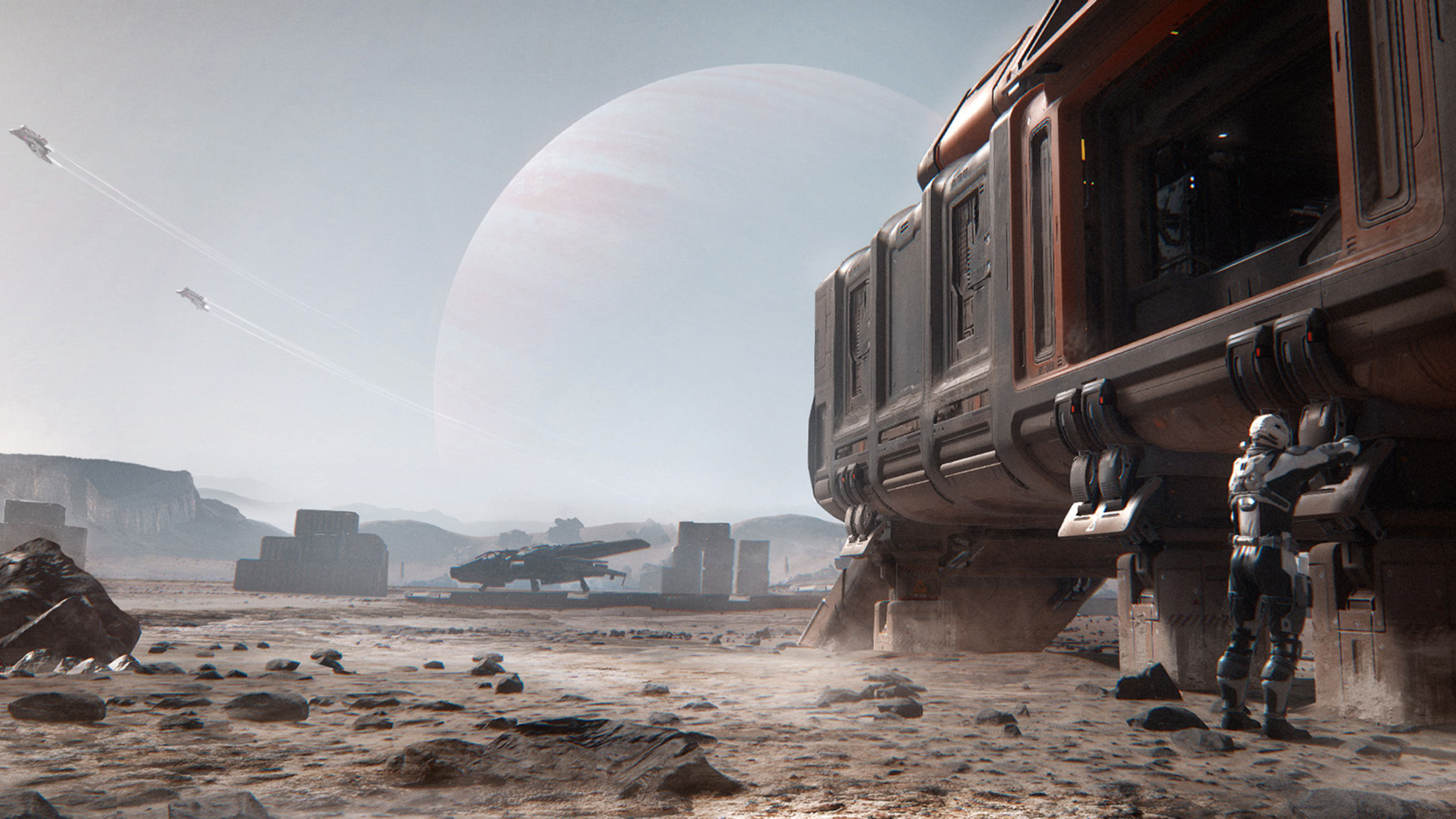
That brings us on to in-game rights, the partner to real-world rights in the terms of service contract. The in-game rights outline to you the limitations and allowances associated with virtual property purchases. Again, this is very much at the whim of the developers.
“Since developers are the creators of the universe in which virtual property exists,” Chang says, “they can really dictate almost anything that relates to the property in-game. They can allow another user to intrude on to the land, to take virtual resources from the land, to squat on the land, etc. It’s completely up to how the developers want to treat it. In the case of Star Citizen, it looks like the in-game right that you are actually purchasing is the ability to have the virtual authorities force an intruder off the land. But how frequently police patrols occur, how fast they respond when called, and how much force they exercise is completely up to the developers.”
In Star Citizen, you will be able to lay claim to land anywhere outside UEE space for free by simply turning up and building something there. But the problem is that there is nothing to stop another player from trashing your house and stealing all your stuff. Land and buildings will persist in the game whether you are playing or not – they don’t just wink out of existence when you log off, like spaceships do in Star Citizen and similar games like Elite Dangerous. So, by purchasing a land claim in UEE space, you are essentially buying the right to have your property defended when you are not there.
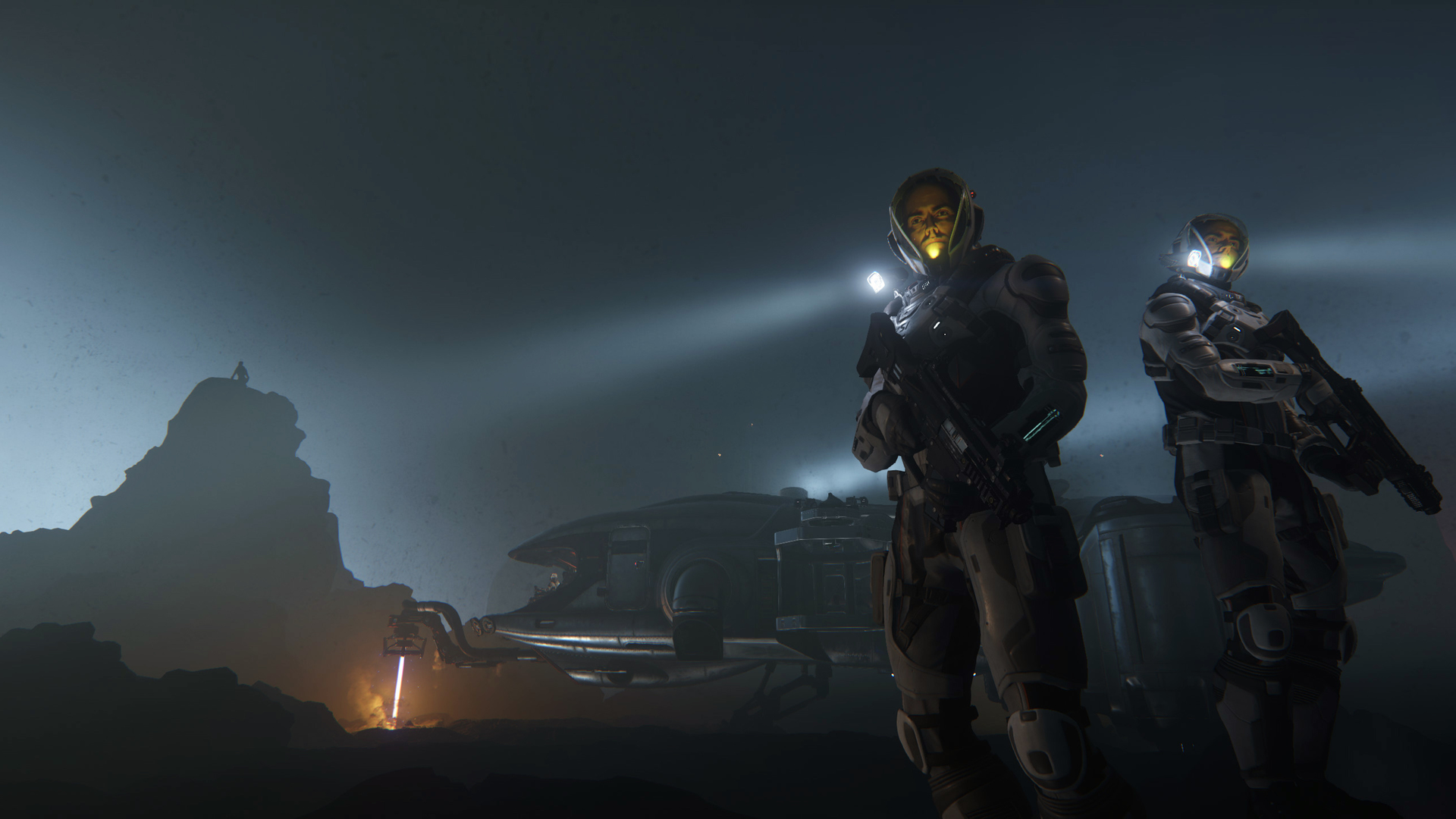
I asked Tony Zurovec, persistent universe game director for Star Citizen, about what level of protection players would receive. “UEE space will be routinely patrolled by security forces,” he says, “and just as they would respond to violence they’ll react to the illegal extraction of resources from another player’s property. However, security forces are limited, so unless a player is able to communicate such an infringement upon their rights to the authorities the odds of the transgressor being caught are remote.
“Since players often won’t be in proximity to their property, they’ll frequently want to purchase various forms of remote monitoring and security apparatus – cameras and other equipment that can broadcast important information to them, members of their organisation, or UEE security, or automated drones that can automatically engage trespassers. The Service Beacon will also play a role here, as it will allow players to hire other NPCs and players to safeguard their assets.” It sounds like it will be up to you to ensure your property has suitably beefy security to see off wrongdoers, then.
Being confident that your property rights will be upheld is the key to building an economy. In 50 Things that Made the Modern Economy, the economist Tim Harford sums up the importance of a strong property registry with the example of farmers gaining legally defined boundaries for their land: “If you know your neighbours respect your boundaries, you can feel confident investing time in weeding your vegetable plot or building a house.” If players are to create a flourishing economy, then, they need to be confident that their land and goods will not be taken away from them.
In the end, like buying a house in real life, it all comes down to what the neighbours are like – and what they are allowed to get away with.
Good fences make good neighbours
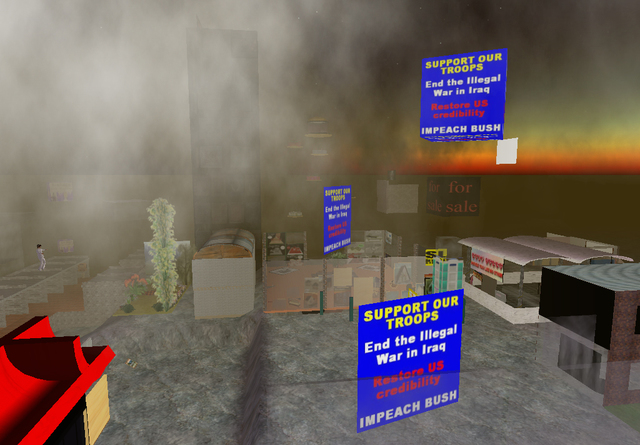
If we want to examine the consequences of annoying neighbours, where better to look than Second Life, in which pretty much everything you could possibly imagine would happen in a virtual universe has already occurred over its 15 years of existence. Lots of things you probably haven’t yet imagined have happened too, like when a four-foot-high green alien was chased off a nudist beach in the midst of a moral panic over so-called ‘age play’.
Wagner James Au has been reporting on the events of Second Life for many years through the blog New World Notes. In 2005, he chronicled the bizarre saga of one individual buying up plots of land across the metaverse and erecting giant, blue billboards emblazoned with the message: ‘SUPPORT OUR TROOPS – End the Illegal War in Iraq – Restore US credibility – IMPEACH BUSH’. Obviously, many Second Lifers who lived next to the billboards were irritated by their appearance – and the only way to get rid of them was to buy the land they were built on, often at extortionate rates. To this day, people are undecided whether it was a legitimate political protest or a money-making scam.
What makes this saga worthy of study is the response from the developers at Linden Lab. Despite widespread complaints about the billboards they did absolutely nothing. Then-CEO Philip Linden said in a statement that, “although many people doubtless find billboards with political opinions unappealing, we are convinced that to grow to really reach huge numbers of people all over the world, Second Life will have to preserve a free and open environment.” In other words, do what you want, and sort it out among yourselves.

While the 4km2 area defined by Star Citizen’s aforementioned land claim beacons should make it easier to ignore any space billboards erected in neighbouring quadrants, it remains to be seen what attitude Cloud Imperium will adopt for its persistent universe. Will intervention to protect people from griefers be the norm? Or will anarchy reign, with players left to fight their own corner?
“Our goal is to create an environment that allows players and the game itself to push back as necessary to minimise disruptive behavior, rather than to try and enforce a certain type of behavior via the use of administrative discipline,” Zurovec tells me. “A player that repeatedly attacks another or that destroys or steals property within UEE space, then, would see their criminal status gradually elevated – and the bounty on their head raised – to the point that they’d eventually become a very attractive target to other players and NPCs, which would in turn cause that player to modify their behavior or face the consequences.
“Reputation will be tracked in a number of different areas, which means that a player’s actions will have a significant impact in many different ways, from how characters react to them to the organisations willing to grant them membership to the missions that they’re offered. Players outside the secure confines of UEE space may elect to join an organisation for the protection that it provides, or hire mercenaries to provide assistance at needed times.
“Inevitably, some players will discover clever exploits to these systems, and depending upon the severity and how quickly we’re able to adapt we may at times need to resort to administrative enforcement of certain guidelines. Longer term, though, we’ll always try to integrate whatever rules and penalties we want to enforce into the game, and then turn players loose to live their virtual life however they see fit.”
It looks like it will be up to players to club together and look out for one another, then. But, perhaps inevitably, there will be some areas of space that are more lawless than others. And that will certainly have an effect on property prices. No-one wants to buy land in a dodgy neighbourhood, and it is likely that the desirability of some areas of UEE space will vary according to aspects including nearby mineable resources and proximity to transport links, but also the kind of people you are living next door to. Certainly, some areas of Second Life are far more desirable – and expensive – than others, simply because of the neighbours.
Second Lifers have figured out ways to deal with the hell of other people. A well-known problem is ‘breaking and fornicating’ – when intruders enter your house and simulate intercourse. Many simply elect to ignore the sexual vagabonds and carry on as if they are not there. But people who get annoyed with such sex strays might opt to erect an impenetrable force field around their property. Yet slapping up a force field is seen by many as not being the ‘done thing’, as it goes against the spirit of freedom the game is built on – indeed, plenty has been written about the etiquette of Second Life.
No doubt Star Citizen will develop its own etiquette. But the problem of what to do about annoying neighbours will be ongoing. And if Cloud Imperium start selling impregnable force fields that keep strangers off your lawn then they are likely to have plenty of takers.
Breaking free from virtual bonds
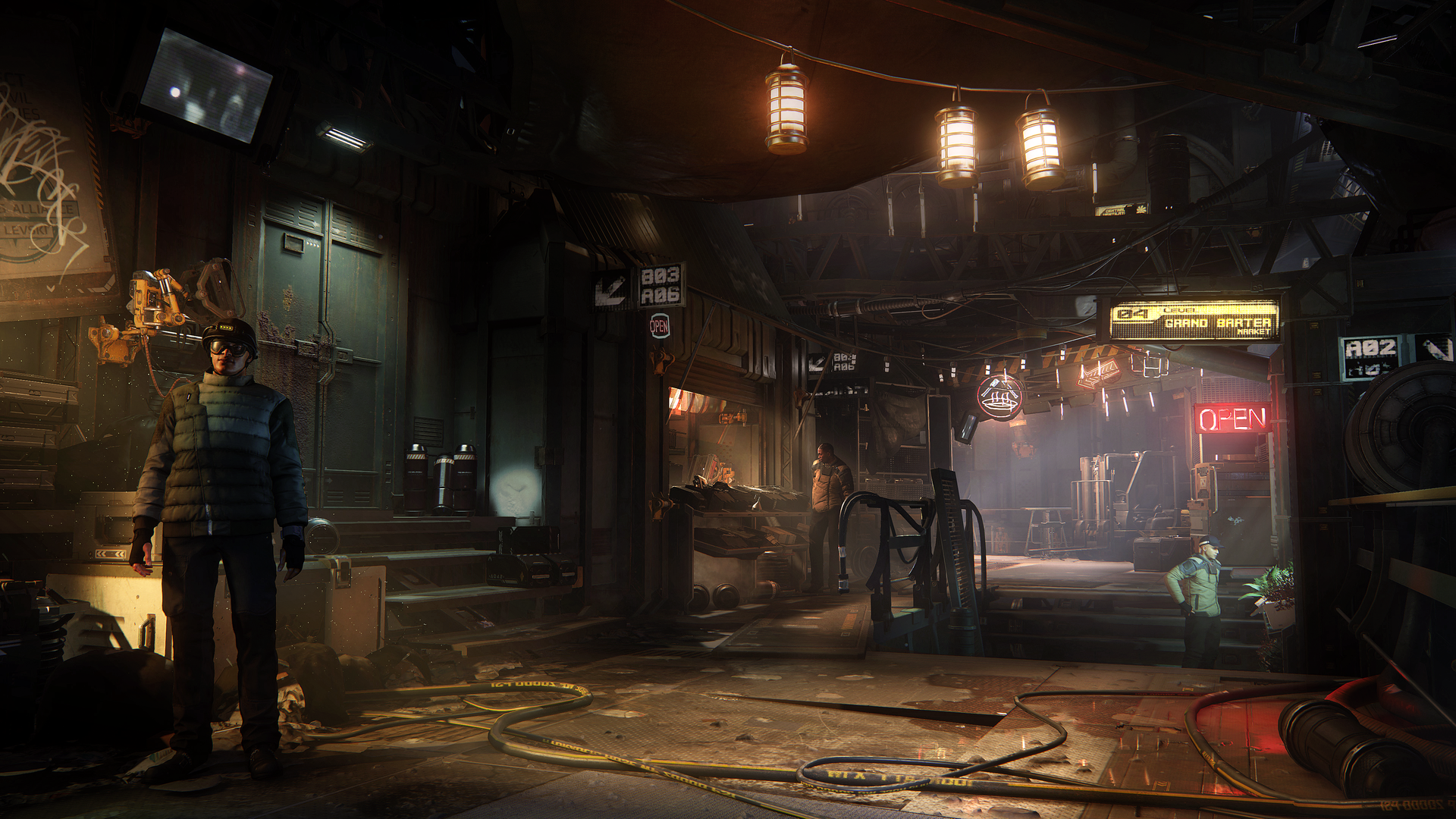
In some ways, living in a virtual world is like living under a totalitarian government. The developers have absolute control over what you do, where you can go, and even whether you can live there at all. The developers’ regime might be extremely hands-off, as in Second Life and the space-based free-for-all Eve Online, or it might be tightly controlled, as in the now-defunct child-oriented MMO Club Penguin. But, either way, the developers dictate the rules – and their say is final.
But what if it isn’t? “As MMOs have become more and more popular,” Chang says, “people have brought lawsuits over their in-game items.” With some players now spending thousands of dollars on in-game items it is almost inevitable that further legal disputes will emerge if players feel that developers are being unfair. Chang notes that most cases are resolved via the terms of service contract – but, sometimes, the terms of service themselves can be questioned and overruled.
In Second Life, an early version of the terms stated that disputes must be resolved by mandatory arbitration – that is, disagreements must be resolved out of court. But in the case of Bragg vs. Linden Lab, in 2007, it was found that this clause was “unconscionable” and could not be enforced. “However,” Chang says, “the fact that the court did not enforce the arbitration clause was an exception, and was partially dependent on the arbitration clause being hard to find in that agreement. In most cases, the rule is that the relationship between the developers and player – including the exchange of rights with respect to virtual property – comes out of what is written in the terms of service.”
Buying or gambling?
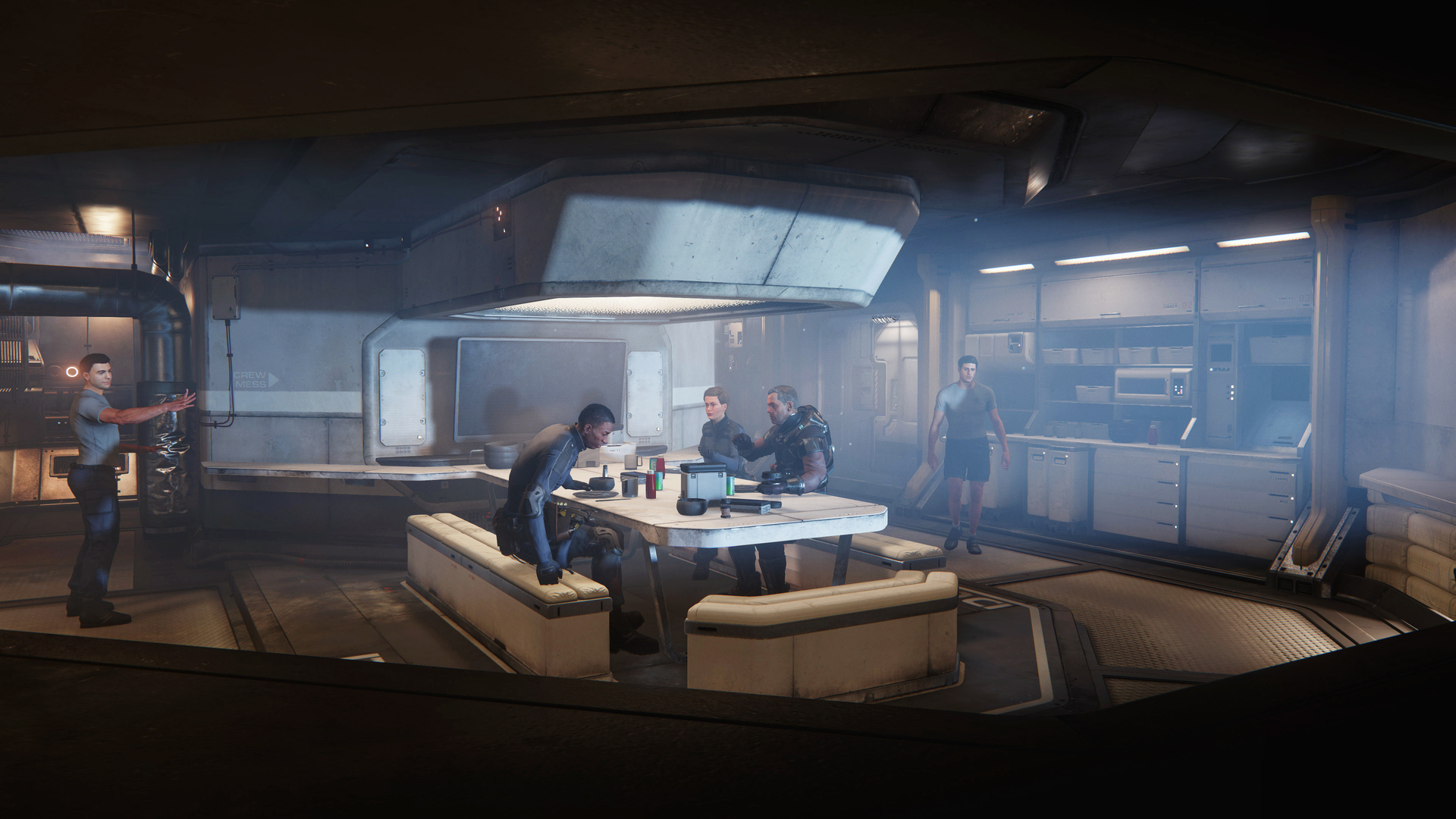
Going back to the UEE Land Claim Licence, Chang observes a potential problem with how land is going to be divvied up in Star Citizen. The Star Citizen shop notes that, after sinking the beacon into the ground, you snap off the glowing tip (a memory module) and deliver it to a UEE Planetary Development office to lay claim to the land surrounding the beacon. But, Chang adds, “one possibly interesting thing is that the UEE Land Claim License only claims the land for the user if the land hasn’t already been claimed.”
“Now, since the mechanics of the game haven’t been finalised yet, we don’t know how or if users are going to know if the land has been claimed before attempting to stake their claim. But if it’s too difficult for users to find out whether other people have already staked a claim, and if there is a chance that the licence may only end up being a right to try to claim land so a user may end up with nothing, the developers of Star Citizen may have to consider whether what they are implementing is going to become a form of gambling, and will have to be sure not to run afoul of gambling laws.”
With this in mind, I asked Zurovec to clarify exactly how the land claiming system will be implemented in Star Citizen. “The beacons are used to generate a set of coordinates for the parcel of land you wish to claim and broadcast ownership of the plot to nearby players but they don’t directly confer ownership. So, if the area you staked out is claimed by another before you can register with the UEE Planetary Development office, you’ll simply have to obtain a new beacon – which is just an inexpensive piece of hardware – so that you can choose a new area. Your claim licence – which is what grants you the right to a piece of land – is unaffected by such registration issues.”
Your claim licence will not be lost if you try to claim land that has already been nabbed by another player, then. So Chang’s fears about gambling are unfounded. But the issue shows just how careful developers have to be when implementing features – and the potential legal ramifications of getting it wrong.
Buy everything, own nothing
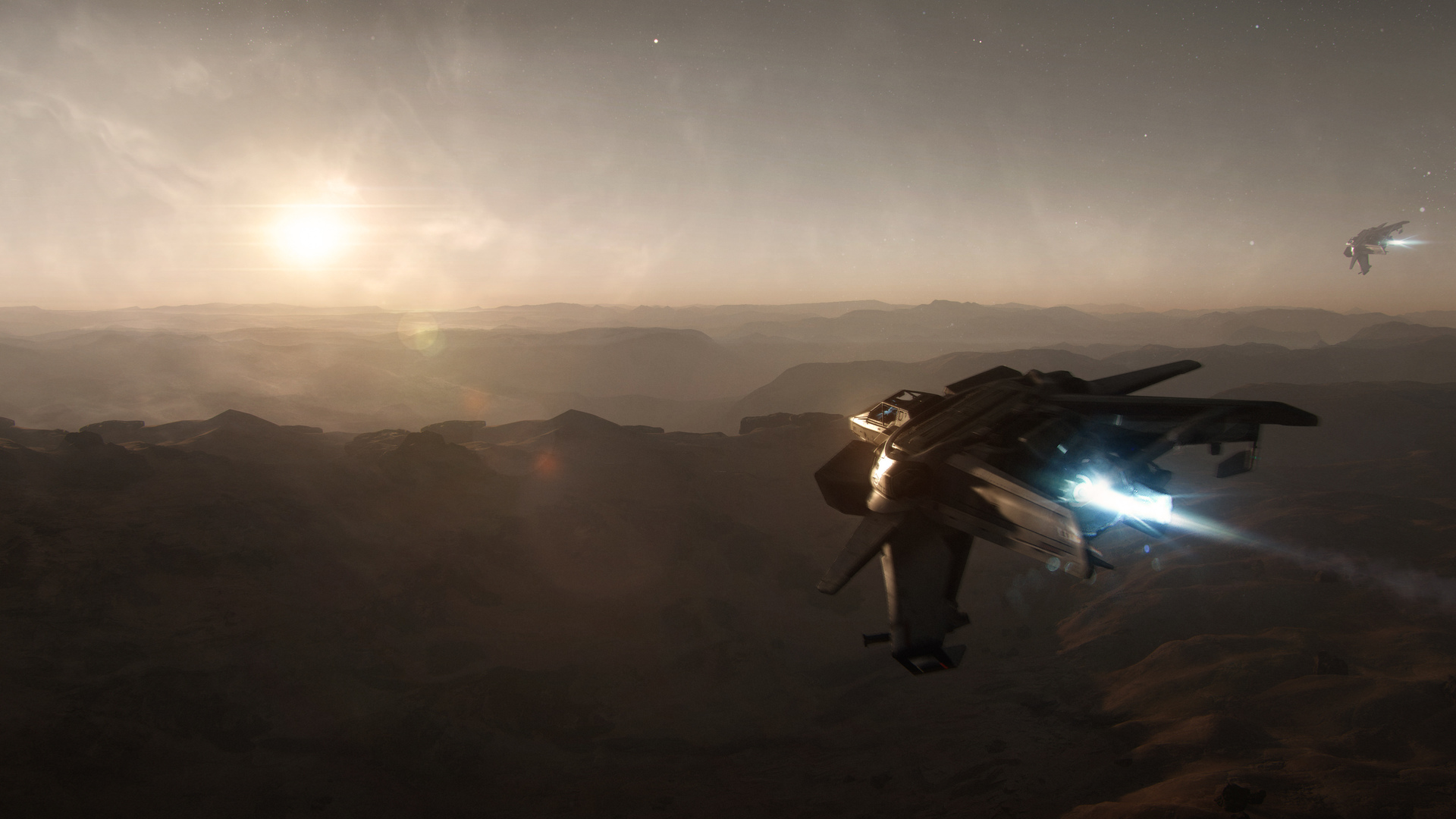
In terms of ownership, buying virtual property in Star Citizen or any other MMO is not unlike leasing a property in the real world. You can use it and live in it, but ultimately it is owned by someone else – the developers – and they can do with it what they will under the terms of service that every player signs up to. Like the property itself, your ownership is virtual.
Ultimately – and inevitably – all virtual property is ephemeral. Second Life player Masami Kuramoto neatly sums up this quandary in a comment underneath a discussion over whether Second Life constitutes a ‘metaverse’ – a persistent virtual universe similar to the one described in Neal Stephenson’s influential novel Snow Crash. “Second Life is a department store where you can buy everything but not own anything.” they write. “When Second Life shuts down, all the things you ‘own’ will disappear.
“Your entire virtual property is an illusion.”
